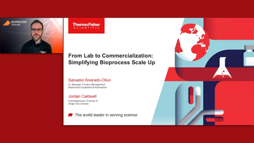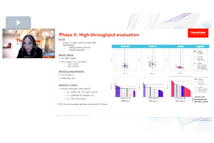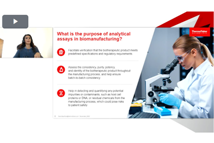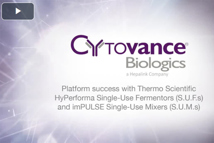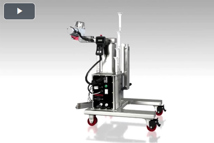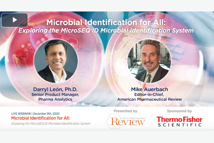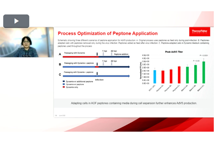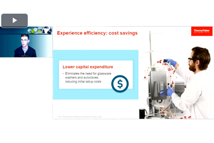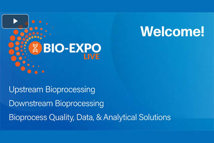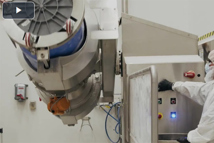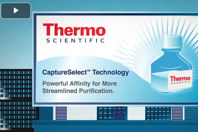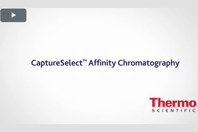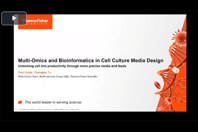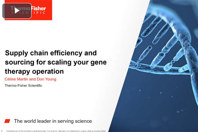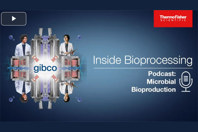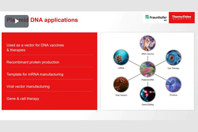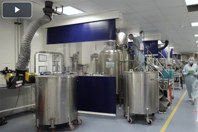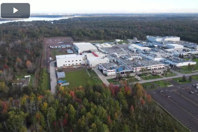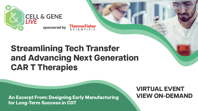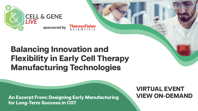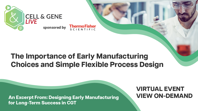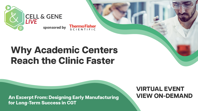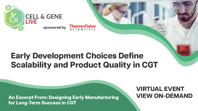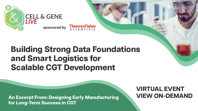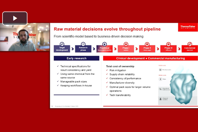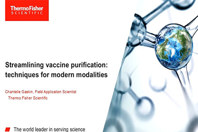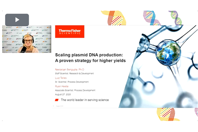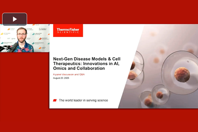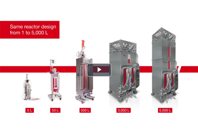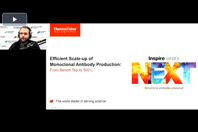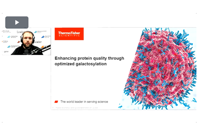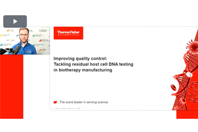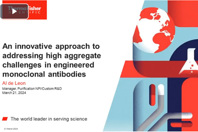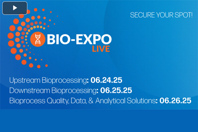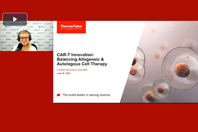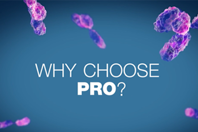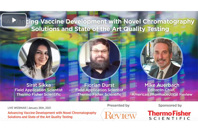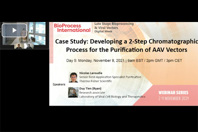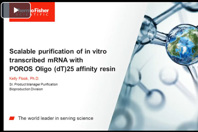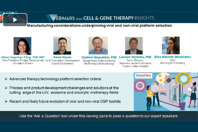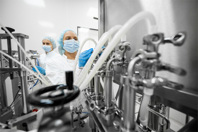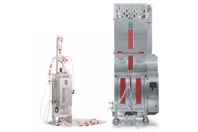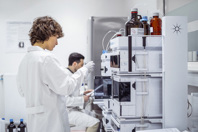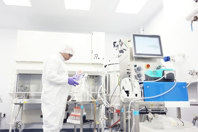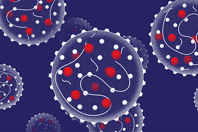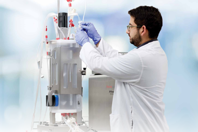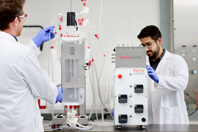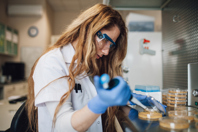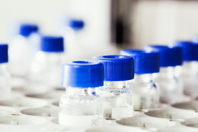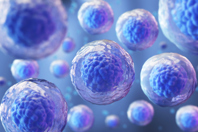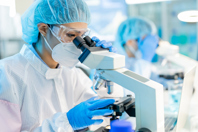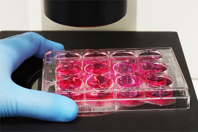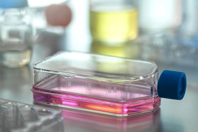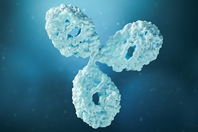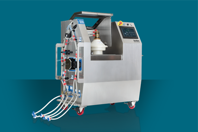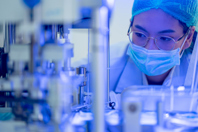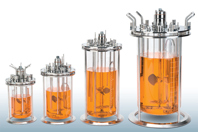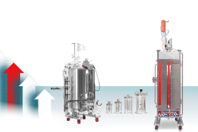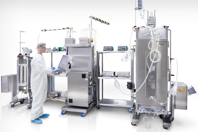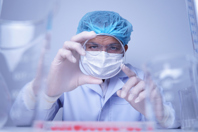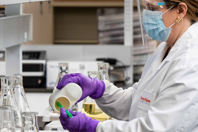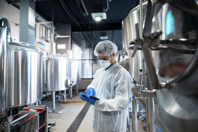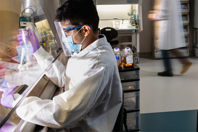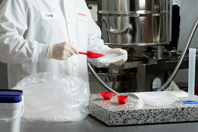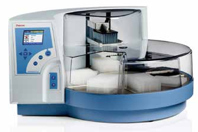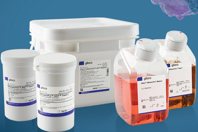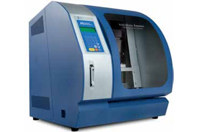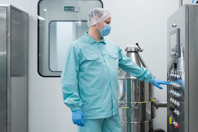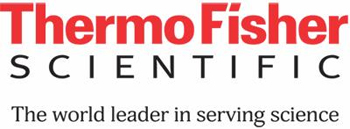
ABOUT THERMO FISHER SCIENTIFIC
Thermo Fisher Scientific is a leading global provider of cell and gene therapy development solutions. We accelerate your novel therapeutics from clinical development to commercialization. With our comprehensive portfolio of products and services we will be your dedicated partner throughout the development journey.
Key Capabilities:
- Plasmid construction, vector production, and purification
- Cell isolation, engineering, expansion
- Lot release, characterization, and preservation
- Formulation, fill, and finish
- Expert professional support to meet process, scale, quality, and regulatory requirement
CONTACT INFORMATION
Thermo Fisher Scientific Bioproduction
7305 Executive Way
Frederick, MD 21704
UNITED STATES
Contact: Hunter Tuck
BROCHURES
- Media By Design: Gibco CHO Media And Feed Panel Evaluations
- Custom Media Development Services
- Compliant Storage For Chemicals, Process Liquids, And Buffers
- Inventory Management Support For Chemicals, Process Liquids, And Buffers
- Nunc Cell Factory Systems
- Molecular-Based Detection And Testing
- Cell Therapy Analytical Testing Solutions
- Transform Process Development With The 5L DynaDrive S.U.B.
- Cell Therapy From Culture To Cure: Enabling Your Path From Discovery To Commercialization
- Gibco Efficient-Pro Medium And Feeds Evaluation Guide
- CTS Detachable Dynabeads CD3/CD28 Magnetic Beads
- Freedom Cell Line Development Kits
- CHO Cell Culture Solutions For Biomanufacturing
- Drive Your Performance Forward With The Expanded Family Of Efficient-Pro Feeds
- Are You In Control Of Your Protein Galactosylation Profile?
- Bioproduction Sustain Program: Helping You Meet Your Sustainability Goals
- Looking For A More Affordable Source Of Protein A Resin?
- Confidently Match The Right Feed With Your Cell Line
- Thermo Scientific™ DynaSpin™ Single-Use Centrifuge
- Bioproduction Analytical Services
- Focused Analytics Packages For Cell Culture Media
- Metabolite And Lipid Analysis Service
- Tailored Process Development Services Designed For Success
- Rapid Sterility Testing: Actionable Results In Less Than 5 Hours
- Efficient-Pro Medium And Feed Selection Guide
- Prep For The Future With Instruments For Automated Sample Preparation
- Automated Purification For DNA, RNA, Proteins, Or Cells
- Maximize Efficiency With Gibco Process Liquids And Buffers
- Process Liquids Preparation Services For Biopharmaceutical Manufacturers
- Chemically Defined Supplements Designed With Performance In Mind
- Peptones Tailored For Vaccine Production
- Simplify Your Peptone Screening Process With Gibco Starter Paks
- Enhance Efficiency With Ready-To-Use Sodium Chloride Solutions
- Boost Your mAb Purification Workflow With A New Mixed-Mode Resin
- Cell Nutrition That Delivers Young, Healthy T Cells For Your Process
- Reduce Time Detecting Leached Ligands In AAV Purification
- Accelerate Biotherapeutic Commercialization From Drug Development Through Production
- Advance Lentiviral Purification
- Companion Product Solutions For AAV Development
- Microbial Identification For Control In Environmental Monitoring
- Moving Forward In Microbial Identification-MicroSEQ Microbial Identification System
- The Way Forward In Mycoplasma Detection
- Potent, Selective Modulators Of Protein Functions
- Supporting Bench To Production Applications For Multiple Industries
- Chemical Products And Services At A Glance
- Evolve Your Processes With Clinically Proven Cell Therapy Solutions
- CTS Dynacellect Magnetic Separation System
- Bioproduction Regulatory Consulting Capabilities
- Evolve The Future Of Cell Therapy Manufacturing
- DynaDrive Single-Use Bioreactor (S.U.B.)
FEATURED ARTICLES
-
Peptones enhance CHO cell growth, viability, and yield, offering a fast, low-risk way to improve bioprocess performance without major process changes.
-
Cable ties in bioprocessing can cause leaks, damage, and delays. See how switching to a uniform-sealing connector can significantly improve efficiency, reduce prep time, and minimize contamination risks.
-
Consistent cell growth and protein yields from 5 L to 5,000 L show how a unified bioreactor design can simplify scale-up, reduce risk, and accelerate upstream process development in bioproduction.
-
Helium leak testing offers unmatched sensitivity for detecting micro-leaks in single-use fill-finish systems. Learn how tighter leak thresholds can strengthen aseptic processing and regulatory confidence.
-
Surge bags are essential to fill finish efficiency, but poor drainage can cause costly product loss. Learn how drainage testing helps identify high-performance bags that maximize recovery and reduce waste.
-
Learn how rapid molecular methods of cell therapy testing like qPCR for mycoplasma, sterility, and lentiviral quantification are key to accelerating product release and timely treatment delivery.
-
Successful analytical method transfer is crucial for product quality and regulatory compliance. Learn best practices for tech transfer, including how gap assessments mitigate common risks and streamline bioprocessing.
-
An integrated solution for impurity and sterility analysis streamlines data, supports regulatory compliance, and uses built-in algorithms to deliver accurate, actionable results quickly.
-
As you build a Mycoplasma testing strategy to ensure drug safety, there are three analyte types to choose from: live Mycoplasma, RNA, and genomic DNA, each offering distinct advantages.
-
Learn how a bench-scale single-use bioreactor offers process development advantages over traditional glass systems, including higher efficiency, increased productivity, and enhanced sustainability.
-
Maintaining a consistent bioprocess when scaling from 5 L to 50 L is achievable. This study shows how to successfully scale processes while maintaining cell density, viability, and protein production.
-
Optimize your CHO-K1 GS cell line with advanced chemically defined, animal origin-free feeds. Achieve higher titers and reliable product quality.
-
Peptones offer a strategic solution to key biomanufacturing challenges by enhancing cell culture performance, improving yields, and reducing production costs.
-
A shift from traditional rocking motion systems to stirred-tank bioreactors can enhance T cell expansion, offering greater scalability and more intimate process control.
-
Reducing serum in vaccine manufacturing is a key consideration for lowering costs and improving supply security. We compare performance in serum-free versus serum-supplemented media.
-
Improve cell dissociation with a gentle, recombinant enzyme. This temperature-stable protease shows dissociation kinetics similar to porcine trypsin but with lower cell toxicity and greater overall purity.
-
Though the journey to mAb development begins at lab scale, for clinical trials and commercial distribution, a production process must be streamlined and scalable to 2,000 L production and above.
-
Peptones have become a key tool in CHO cell bioprocessing, enhancing monoclonal antibody yield and quality.
-
To meet the growing demand for mAbs and their variants, it is important to leverage opportunities for optimization as well as work with suppliers that have the resources to help your workflow thrive.
-
Optimize your bioprocessing harvest with single-use centrifugation. Reduce costs, waste, and space needs compared to traditional depth filtration methods.
-
Learn about strategies such as regional manufacturing and advanced single-use systems and their potential to minimize carbon footprint and enhance sustainable biomanufacturing.
-
For successful scale-up, see how optimizing process parameters such as attachment methods, gassing, and agitation can help reduce cell environmental stress, ultimately improving productivity.
-
Support the advancement of malaria vaccine development by leveraging innovative bioprocessing solutions to enable efficient, scalable, and accessible vaccine production worldwide.
-
This study explores scaling a high-demand fed-batch process from bench to pilot scale, highlighting control parameter differences at 50L and 500L while maintaining consistent growth and product titers.
-
Optimize your monoclonal antibody purification with cutting-edge flow-through chromatography. Learn how POROS resins enhance polishing efficiency, improve aggregate removal, and streamline bioprocessing.
-
Learn how to select high-quality raw materials for cell-based manufacturing in this exploration of the criticality of raw materials, from preclinical development to commercialization.
-
Reach new heights in mAb production with a high-intensity perfusion CHO medium designed to support consistently high product yield and quality in continuous perfusion cultures using CHO-K1 cells.
-
Peptones, versatile media additives derived from various sources, offer numerous benefits for biopharmaceutical production.
-
Explore how Difco™ TC Yeastolate ultra-filtered (TCY UF) enabled over 100% improvement in titer for CHO cell culture through feed optimization and bioreactor scalability in a real-world application.
-
Explore scalable processes for lentiviral vector production and clarification at the 50 L scale, utilizing the CTS LV-MAX system and single-use bioreactors for robust gene therapy manufacturing.
-
Discover how the Applied Biosystems™ MycoSEQ™ Plus system and Applied Biosystems™ SteriSEQ™ Rapid Sterility Testing System can help accelerate your cell therapy manufacturing process.
-
Discover customizable solutions for antibody manufacturing, as well as services for media optimization, feeding strategy optimization, and format conversion.
-
For manufacturers working with a dry powder medium (DPM), early consultation with a supplier can increase the likelihood of success. Uncover a two-phase scale-up strategy for the production of DPM.
-
Accelerate your biotech company's scale-up process while delivering consistent and strong cell growth, productivity, and product quality.
-
This study focuses on characterizing recombinant LVVs used in gene-modified cell therapies, utilizing two real-time PCR assays adapted to the QuantStudio™ Absolute Q™ Digital PCR System.
-
This study presents a high-efficiency method for extracting and quantifying residual DNA from host cells using a semi-automated, high-throughput workflow.
-
This study demonstrated the effectiveness of a medium and feed system when tested at three different scales for its ability to high-quality, fed-batch monoclonal antibodies.
-
Prevent costly disruptions in your bioproduction process. Discover how a PCR-based method can quickly detect the presence of mycoplasmas in raw materials, cell banks, and in-process and lot-release samples.
-
Achieve early detection of cell culture contamination with a nucleic acid extraction system to provide an integrated system for rapid and sensitive detection of mycoplasma, MMV, and vesivirus.
-
This article details the design and application of a Plasmid DNA - Kanamycin Resistance Gene (pDNA-KanR) kit for residual plasmid quantification in gene therapy manufacturing.
-
This comparative bench-scale study features active-release beads that could improve the reliability, consistency, and longevity of cell therapy treatments.
-
With a helpful assessment and the right process liquid preparation services, the CDMO featured in this study was able to find a path toward meeting the surge in demand for a client's therapeutic .
-
A customer sought to replace a chemically defined CHO medium with a more efficient medium and feed pairing strategy in bioreactors.
-
For small and midsize biopharmaceutical organizations, outsourcing buffer and process liquid preparation, quality testing, and storage could significantly streamline operations and reduce regulatory risk.
-
The rapid sterility test kit used in the study was able to quickly detect bacteria and fungi in complex cell therapy product matrices, detecting six species listed in USP chapter <71>.
-
Dive into the importance of peptone selection, instructions for reconstituting peptone powders for mammalian cell culture, and discover starter packs containing commonly used peptones for specific applications.
-
Explore innovative solutions for CDMO's striving to remain competitive as the biopharmaceutical market grows and evolves.
-
Study the development and performance of this animal origin-free (AOF) T cell culture medium designed for T cell expansion through an experiment comparing it to other AOF or xeno-free basal offerings.
-
Explore a solution for biopharmaceutical companies concerned about the risks an increase in campaign volume can pose to their production timeline.
-
Explore the stocking solution offered to a mid-sized CDMO in need of a high volume of safety stock inventory to support their customer portfolio growth.

